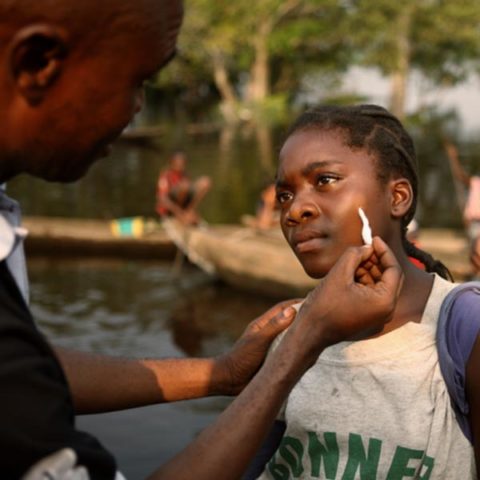
Join us on June 27 for Leprosy, dehumanisation and extreme vulnerability at the Palais des Nations
How to fulfil the 2030 Agenda for stigmatised social groups
Geneva, 18 June 2019 – What is known about leprosy as a condition, from a scientific or biomedical perspective, does not address how people affected by the disease are dehumanised – day after day, in countries around the world – through their lived experience.
“…The label of leprosy has been associated with the abuse and violation of countless women, men and children. And that is true whether these people had visible impairments or not. So, the barriers, the exclusion, the dehumanising attitudes of society, are not just about visible impairments or even about a disease…: they are in the label and in this long, long history of discrimination at all levels.” Geoff Warne, Chief Executive Officer, International Federation of Anti-Leprosy Associations (ILEP).
Each year more than 210,000 women, men and children are diagnosed with leprosy. Up to 50% of people affected by leprosy will experience depression or anxiety due to ongoing stigmatisation on the grounds of their disease. Discrimination and dehumanisation also increase the risk of suicide among people living with leprosy.
Stigma still frames many discriminatory laws in place, in many different jurisdictions, against persons affected by leprosy. ILEP research has revealed that 145 laws discriminating against people affected by leprosy exist in 29 countries. Other ways that stigma is being perpetuated is through social exclusion, a lack of community participation of persons affected, and no or little access to services (economic and social) and rehabilitation.
“I would say that we’re witnessing another turning point in the modern history of leprosy now, with the growing consensus that a human rights agenda is critical for tackling leprosy and leprosy-related discrimination,” said Alice Cruz, UN Special Rapporteur on the elimination of discrimination against persons affected by leprosy and their family members. “However, we have a lot of hard work ahead to raise awareness about leprosy as a human rights issue in the global human rights community and the leprosy community itself. Both still see leprosy as a health issue and that is why we need to foster participation and give voice to persons affected as the first step towards a human rights approach.”
To really understand how stigma is dehumanising to people affected by leprosy, the Permanent Missions of Japan, Brazil, Ecuador, the Republic of Fiji, India and Portugal, ILEP, and the Sasakawa Health Foundation invite you on June 27, 2019, to the Palais des Nations at a side even to the 41stHuman Rights Council to learn about the lived experience of stigma, discrimination and dehumanisation of persons affected by leprosy and their families. It will explore practical ways to ensure that no one is left behind in efforts to achieve the Sustainable Development Goals.
“Since I have experienced the pain and effects of being affected by leprosy, like difficulties in getting correct treatment, facing stigma, it is easier to understand the thinking and emotional disturbances of these people,” said Rachna Kumari, a Community Mobiliser in a LEPRA Society’s leprosy referral centre in Munger, Bihar State, India, and a member of the ILEP Panel of Men and Women Affected by Leprosy.
Bringing attention to the experiences of people affected by leprosy, and showing how their participation – working with civil society, NGOs, specialised agencies, regional human rights mechanisms, national human rights institutions and the overall United Nations system – is moving the world forward, will be the only way to achieve zero discrimination and will help to bring us one step closer to a world with zero leprosy.
About Alice Cruz
Alice Cruz is the UN Special Rapporteur on the elimination of discrimination against persons affected by leprosy and their family members. The Human Rights Council appointed her to lead the mandate on 1 November 2017. Before that Alice worked as External Professor at the Law School of University Andina Simón Bolívar, Ecuador. She has worked with the Brazilian non-profit organisation Movement for the Reintegration of Persons Affected by Hansen disease (MORHAN) and has served as a member of the International Leprosy Association’s Council (2014-2016). Alice has researched and written on the subject of eliminating leprosy and the stigma attached to it since the beginning of her career.
About ILEP
ILEP is a membership organisation of 13 international NGOs whose outreach spans 69 countries and 710 project locations worldwide. ILEP is supported by two advisory boards; a Panel of Women and Men Affected by Leprosy and the ILEP Technical Commission. In the fight against leprosy, ILEP and its Members work alongside the World Health Organization, Novartis, The Nippon Foundation, other NGOs, governments, Ministries of Health and more than 500,000 supporters worldwide.
About Sasakawa Health Foundation
SHF looks at leprosy as a complex of medical and social/human aspects. SHF believes that a world without leprosy, free from stigma and discrimination, cannot be achieved unless the individuals cured of leprosy enjoy equal and full opportunities as constructive members of the community. SHF supports projects to make them economically and socially independent and empowers them through better education and networking. Since 2003, a representative of people affected by Hansen’s disease has been a member of the SHF Council.